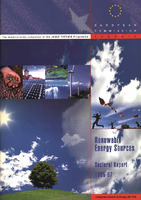| dc.description.abstract | JOULE-THERMIE was launched in 1995 as the European Union's first 'integrated' programme, bringing together the resources of the Directorates-General XII (Science, Research and Development) and XVII (Energy). The aim is to encourage the wider utilisation of non-nuclear energy technologies from research and development, through demonstration, towards the goal of the penetration of these systems into the marketplace. Energy is fundamental to the existence of society, as without it industry, commerce and civil society cannot function. Fortunately, the earth is endowed with considerable energy-giving resources, mainly in the form of fossil fuels, such as oil, gas and coal. These are, however, unevenly distributed globally and are finite, so their use raises questions regarding security of supply and environmental sustainability. The JOULE-THERMIE programme supports research and technological development aimed at addressing these issues through the research, development and demonstration of technologies which enable us to reduce our energy demand, and to use what we need more cleanly and efficiently. The THERMIE component of the programme focuses on the targeted demonstration of clean, efficient, cost-effective, and environmentally-friendly energy technologies. It participates in actions to prove the technological and economic viability of these technologies and promotes their wider replication and market penetration both within the EU and beyond, particularly in Central and Eastern Europe and the developing world. It promotes the application of a new energy infrastructure which fully utilises renewable energy sources, seeks to improve the efficiency of energy use and makes better use of fossil fuels. It also promotes improvements in the exploration, distribution and transport of hydrocarbons. |

